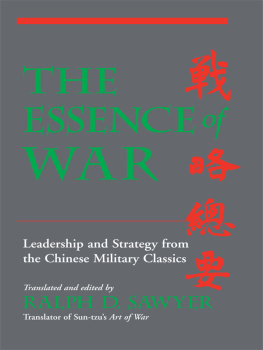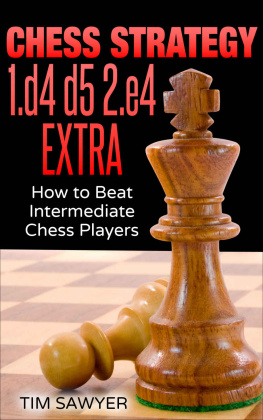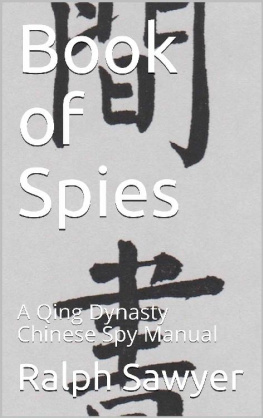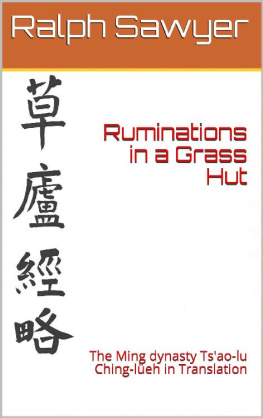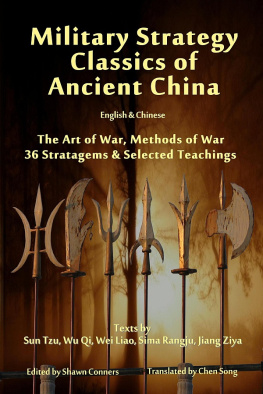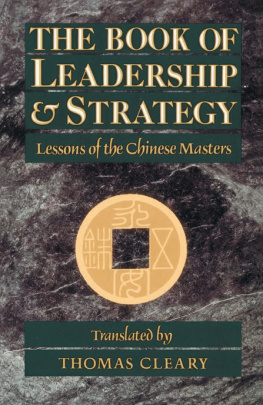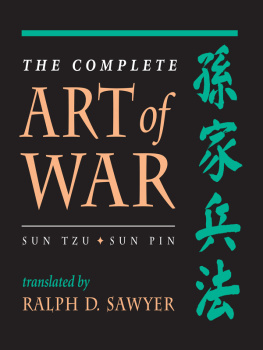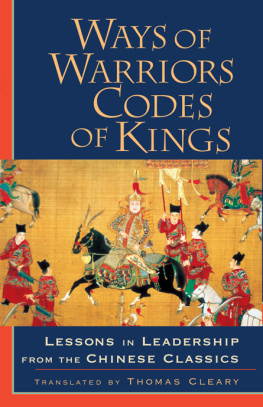The Essence of War
Other Works by Ralph D. Sawyer
Published by Westview Press
- Fire and Water:
The Art of Incendiary and Aquatic Warfare in China
- The Tao of War:
The Martial Tao Te Ching
- Sun-tzu: Art of War
- The Complete Art of War
- The Seven Military Classics of Ancient China
- Sun Pin:
Military Methods
- One Hundred Unorthodox Strategies:
Battle and Tactics of Chinese Warfare
- The Tao of Spycraft:
Intelligence Theory and Practice in Traditional China

The Essence of War
Leadership and Strategy fromthe Chinese Military Classics
Translated and compiled by
Ralph D. Sawyer
All rights reserved. Printed in the United States of America. No part of this publication may be reproduced or transmitted in any form or by any means, electronic or mechanical, including photocopy, recording, or any information storage and retrieval system, without permission in writing from the publisher.
Copyright 2004 by Ralph D. Sawyer
Originally published as The Art of the Warrior.
Published in the United States of America by Westview Press, A Member of the Perseus Books Group, 5500 Central Avenue, Boulder, Colorado 80301-2877, and in the United Kingdom by Westview Press, 12 Hids Copse Road, Cumnor Hill, Oxford OX2 9JJ.
Find us on the world wide web at www.westviewpress.com
Westview Press books are available at special discounts for bulk purchases in the United States by corporations, institutions, and other organizations. For more information, please contact the Special Markets Department at the Perseus Books Group, 11 Cambridge Center, Cambridge, MA 02142, or call (617) 252-5298, (800) 255-1514 or email .
Library of Congress Cataloging-in-Publication Data
The essence of war : leadership and strategy from the Chinese military classics / [translated, compiled, and introduced by Ralph D. Sawyer].
p. cm.
Selections from the Seven military classics of ancient China. 1993; and Sun Pin's
Military methods. 1995.
Includes bibliographical references and index.
ISBN 0-8133-9049-4 (pbk. : alk. paper)
1. Military art and scienceChina. 2. War. I. Title: Leadership and strategy from the Chinese military classics. II. Sawyer, Ralph D. III. Sun, Bin, 4th cent. B.C. Sun Bin bing fa. English. Selections. IV. Wu jing qi shu. English. Selections.
U101.E87 2004
355.02dc22
2004000826
The paper used in this publication meets the requirements of the American National Standard for Permanence of Paper for Printed Library Materials Z39.481984.
Typeface used in this text: 11-point ITC Galliard
10 9 8 7 6 5 4 3 2 1
Preface
CHINAS GLORIOUS CULTURAL tradition, while dating back into the mists of antiquity and expressed by a nearly timeless written language, embodies many disparate intellectual threads. Never simple even at their inception, the philosophical, social, and political concepts that first evolved quickly expanded and were supplemented by religious and other abstract views derived from common life experiences compounded by perception and reflection. Over the millennia syncretic religions such as Buddhism, Zoroastrianism, and Islam were also imported from other civilizations and assimilated to greater or lesser degree, while Chinas tortured political history continued to haltingly unfold, often at the cost of untold suffering.
From any reasonable perspective Chinas continuity has been cultural rather than political, its heritage throughout one of incessant conflict as different peoples, states, and popular movements fought to control its populace and resources. These inescapable battlefield experiences eventually spawned a contemplative literature that sought to fathom the chaos of warfare and master the principles of its employment, whether offensivein the service of Virtueor defensive, to simply preserve the state. Like Taoism, Confucianism, and Buddhism, the three great belief systems of China, the martial culture thus produced its own body of writings and evolved a systematized, ever augmented tradition. Professional commanders and political leaders compelled to wrestle with perplexing military decisions studied and contemplated its books, but alsoeven if reluctantlyso did the intelligentsia because they not only encompassed tactics suitable for the battlefield, but also embodied fundamental philosophical concepts of enduring value integrated with realistic approaches to the art of living and science of management.
Largely defined by the initial conceptions and principles formulated by the great Sun-tzu around 500 BCE through his reflections on the preceding centuries of ever-escalating warfare, the Chinese military writings may be characterized as both cumulative and consistent. Moreover, despite the pronounced tendency of the literati to disparage the military profession, The Seven Military Classics garnered greater respect and were more widely studied than later dynastic writers have implied. Ironically, their impact not only continues undiminished but has surged phenomenally in China, Japan, Korea, and even much of Southeast Asia. In fact, the various texts are now more widely read and appreciated for tactical knowledge and essential wisdom that can be applied in many contexts, understood in many dimensions, than at any time in history.
Anyone familiar with Asian movies and television programs, especially Chinese and Japanese productions, or their American offshootsincluding movies such as The Karate Kid, TheLast Dragon, or Big Trouble in Little China, or serialized television offerings such as Kung-fu, The Master, and Kung-fu, The Legend Continueswill recall that teachings from the various military classics are frequently quoted by the principal characters to explain their actions or explicate plot developments. Moreover, instead of being restricted to the combat genre, in the last decade their employment has extended into popular American movies and TV programs, including Wall Street, The Art of War, the prime-time cartoon hit, The Simpsons, and especially The Sopranos. In many cases the original source has been obscured, and a number of famous lines, including Sun-tzus one who knows the enemy and knows himself will not be endangered in a hundred engagements and subjugating the enemy without fighting is the greatest achievement, have virtually entered idiomatic language.
As a result of this extensive media exposure coupled with their previous historical importance, the Chinese military classics have come to furnish a common conceptual vocabulary for China and the civilizations conversant with its culture, particularly Japan. The influence originates not merely in the subtle, unconscious assimilation of their subject matter on a daily basis, but also as the consequence of assiduous study, imaginative contemplation, and deliberate application to many spheres of life and activity. Such contemporary vigor no doubt stems from the remarkable scope of the texts, a corpus of writings whose authors pondered and incorporated defining beliefs from Confucianism, Legalism, and Taoism to proffer strategic measures and tactical remedies for a wide variety of problems and situations. They provide a psychology of human behavior, motivation, and evaluation; formulate theories and procedures for command and control; and discuss principles for grand strategy and political action. Rather than being idle theory, they are founded and continually focus upon human nature, for it is people who create civilization and culture, men who fight and die.

